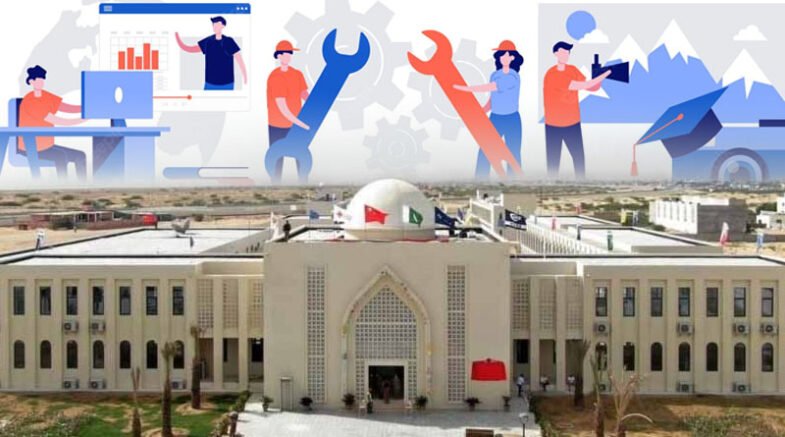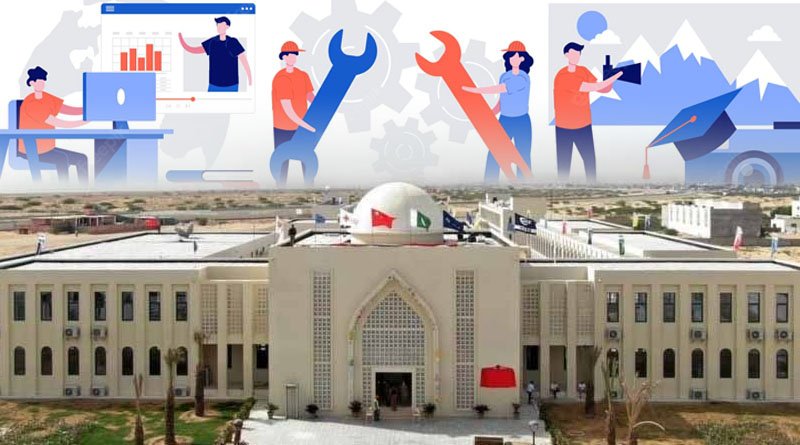The Pak-China Technical and Vocational Institute aim to shape and improve the skills of Gwadar’s active population in order for them to participate in the port city’s growth.

The signing ceremony for the joint operation agreement of the Pak-China Technical and Vocational Institute (PCT & VI), which was built with a Chinese grant under CPEC, was held at Gwadar Business Center on Monday.
Shandong Institute of Commerce and Technology (SICT), Gwadar Port Authority (GPA), The University of Gwadar (UoG), and China Overseas Ports Holding Company (COPHC) signed a joint operation agreement to provide free six-month short courses and three-year diploma programmes with hands-on technical and professional training to thousands of Gwadar youths.
Participants will include students from the University of Gwadar’s first batch of representative students, local COPHC employees, GPA officers, and COPHC officers. While SICT teachers and officers will participate in the ceremony online.
The Chinese government gifted and handed over the Pak-China Technical and Vocational Institute (PCT & VI) to GPA in September 2021 with the intent of training, preparing, and equipping the youth of Gwadar, Makran, and Balochistan with skill sets for the future needs of Gwadar port, free zones, smart cities, a new international airport, and other CPEC projects pertaining to commerce, marine industry, market-based businesses, modern fisheries practises, real estate, tourism, and other sectors.
According to the joint operation agreement, GPA is responsible for providing spaces and supporting facilities to meet the needs of teaching, offices, and accommodations in the existing new PCT and VI buildings. It will work with all government departments to carry out relevant procedures in accordance with Pakistani laws and regulations.
It will also work with COPHC to arrange internships and preferential hiring for qualified PCT and VI students. The University of Gwadar will be in charge of bringing the institute up to international standards. It will work with GPA to manage daily operations, academic and administrative activities, and operating expenses.
This PCT and VI have a total floor area of 7,350 square metres, which includes teaching buildings, training workshops, multi-function halls, and student and faculty dormitories.
According to a GPA official, around 150 trainees completed six-month short courses in collaboration with Pakistan’s National Vocational and Technical Commission (NAVTAC) last year as part of the Prime Minister’s Youth Skills Development Programme.
Under temporary dispensation, the first batch of students received on-site skilled and professional training in five trades, including cargo handling, office management, Chinese language, crane operation, and financial accounting.
“The young people of Gwadar are the main and fundamental stakeholders of the Port City of Gwadar,” said COPHC Chairman Zhang Boazhong.
Their involvement in the operation and management of the deep-sea port, as well as participation in industrial and commercial businesses and urbanisation processes, is critical to all long-term development initiatives. This PCT and VI aim to shape and improve the skills of Gwadar‘s active population in order for them to participate in the port city’s growth.
The development has created opportunities for Gwadar youth, particularly females, in the business activities that will be generated under the Gwadar master plan, which states that the coastal city will create 1.2 million jobs for skilled workers and professionals, with an economic output of more than $30 billion.
